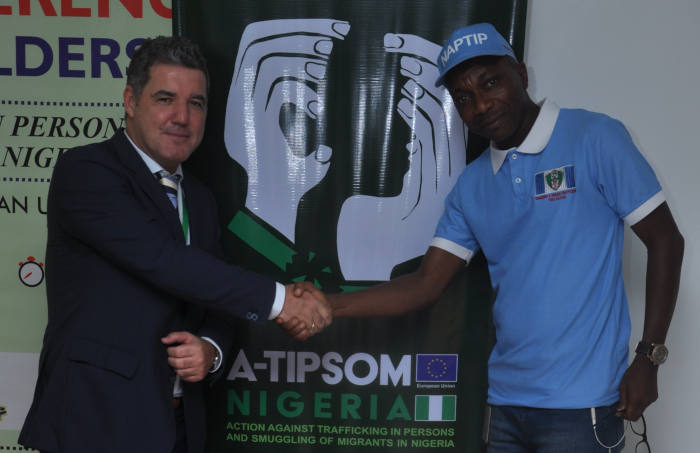-
16 May 2019
Category : Interview
FIIAPP Expatriates: Rafael Ríos
Rafael Ríos, coordinator of A-TIPSOM: the fight against people trafficking and irregular migration in Nigeria, explains how he has been adapting to the country, what his daily routine is like, and what it is like to work as a FIIAPP expatriate.

How long have you been in Nigeria? How have you adapted to this country?
I arrived on 16 July 2018. When you arrive in a new country, as you can imagine, it is not always easy. I remember hearing about other projects, from other colleagues who had been in or were in other countries, who said “the beginning is always the hardest”. For me this has been a bit simpler, or less complicated, and I’ll tell you why. In this country we already had the embassy staff, and they helped us with everything from the outset, arriving in the country, accreditations, looking for accommodation, the office, etc. We spent almost four months in a small office that they kindly lent us until we were able to move. I wish you could count on this kind of support every time you started a project.
What has been the most difficult aspect to adapt to, and the easiest?
The hardest part was perhaps the second week. During the first week everything is frenetic, you have so many things on your plate… But the second week was like coming back down to Earth. That’s when I really started to realize where I was, and the step that I’d taken. Such a long project with so many important challenges. The easiest thing was perhaps meeting people, dealing with the Nigerians, who I think are happy people who enjoy their country and who, in general, welcome newcomers quite readily.
Is this your first experience outside of Spain?
No, it’s not. Belonging to the National Police gives you opportunities like this, discovering other countries and destinations, doing what you enjoy and what you know best. Previously I’d done different jobs in African countries, on short-term missions in Mauritania, Guinea Bissau, Senegal, as well as in Europe, in Italy to be precise.
In light of this, is this proving to be very different to your previous missions?
The concept behind this mission is quite different. This one is long-term and involves a permanent deployment in another country plus working as an expert for FIIAPP . It’s something else entirely, and it’s a big professional challenge for me, since what we are trying to achieve with this project is very alluring, and at the same time very ambitious .
What is your work like, your daily routine?
Honestly, I think it’s not that different. Here, because of the hot weather, you get up and start work quite early. We get to the office, have meetings, go out to the different places we need to visit as part of the project. Usually we have lunch at the office and return home in mid-afternoon.
Is it very different from the routine you had in Spain?
As I said, it is a job that requires a lot of contact with one’s counterparts,which means you are often out of the office, and I find that quite interesting.
What is your relationship like with the FIIAPP team in Madrid?
Great! I would say that, in addition to having a great professional relationship, we talk every day, we share ideas, etc. We have even created bonds that are enabling us to achieve better results in the project, of that I am sure.
And with your colleagues in Nigeria?
The same. Several months on, the team in the field has been growing, with Nigerian personnel, which helps us a lot to understand their way of working, what they’re like, their customs.
How would you assess your experience of working as a FIIAPP expatriate?
It is very positive so far. I think it is helping me to understand how an institution like FIIAPP copes with so many projects and with the scope of the work it does. The training, its structure and its values are enabling me to acquire knowledge. When you belong to an institution like the National Police, sometimes you focus so much on your professional life that you do not realize how work is done elsewhere, so the project is helping to train me both professionally and personally .
Do you have any experiences or anecdotes about your arrival in or adaptation to the country?
Well, I could tell you several, but I’ll just say that I like saying good morning and learning new words in a dialect called Hausa, and in the building where we work I usually see two young people who like to teach me words like that: good morning, let’s go, go ahead… and it makes them laugh when they hear me pronounce them… Inakwana, which means good morning, is part of the day-to-day.
The views and opinions expressed in this blog are the sole responsibility of the person who write them.




